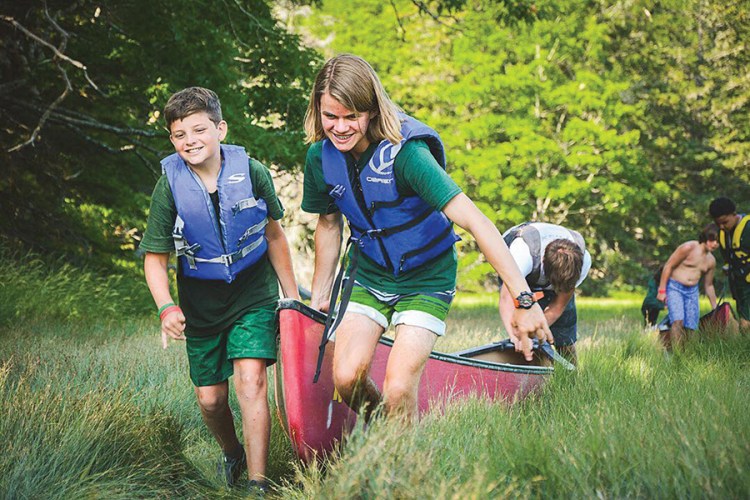
For young adults in their late teens and early 20s who are accustomed to socialization via text and social media, working at camp presents adjustments beyond living in cabins, teaching and guiding youngsters and collaborating with fellow staff. Low-tech summers, camp directors say, can present challenges for staff members used to having a robust social life at their fingertips.
Garth Altenburg was camp director for many years at Camp Chewonki in Wiscasset and in June will start his first summer heading up Camp Timanous, a boys’ camp in Raymond. Altenburg says staff actually have more difficulty than campers adjusting to technology policies.
“Sometimes we get some pushback,” he says, but that reaction “is really a barometer of how well acclimated” staff members are to the camp setting. International staff often find the transition particularly difficult he says. Cultural differences and distance from home can make it “harder to peel them off their phone.”
But Altenburg says those difficulties “say to me, we’re not integrating them as well as we’d like.”
At Maine Teen Camp in Porter, director Matt Pines says counselors may use phones in the staff lounge during free time, but not in front of campers, nor at mealtimes. If staff members use their phone in an unapproved place or manner, they receive a warning. A second warning means the staff member “is kicked off the Wi-Fi network for a day and has to ask permission to join.” If there is a repeat offense after that, the staff member loses Wi-Fi privileges.
“For most staff, the idea of being cut off is pretty powerful,” Pines says.
But Pines says counselors do have the privilege of using their phones to plug into speakers in their cabins and play music for campers. “We’re totally on board with it,” he says.

Peter Kassen and his wife, Meg, direct another coed camp, Hidden Valley Camp, located near Freedom. Peter Kassen says that while some staff members are able to immerse themselves in camp life, and therefore detach from technology smoothly, others “find it hard.” They may be new to camp, or have attachments or situations outside camp.
“Their sense of intimacy extends outside the bubble of camp,” he says.
Kassen says as directors they accept these variations and seek to “be very explicit in explaining to staff what intense community life means.”
Hidden Valley Camp staff are permitted to use phones during off time, in the staff cabin, Kassen says, and they receive guidance about how to “marry outside life” with camp. Pre-camp communications include suggestions that staff prepare for changed relationships with people outside camp.
But while staff members come to camp knowing their technology use will be different, “I don’t think they fully know until they experience it,” he says.
Yet at the end of the summer, staff members often “love” their much-reduced technology experience, Kassen says. Indeed, communication to staff about cell phone use includes this quote: “I went virtually all summer without checking my Facebook or email. I cannot tell you what a relief that was. It sounds like a trivial detail but I think it’s a testament to the fact that I was really ‘present’ in the moment, with all my energy focused on connecting with my campers and co-workers.”
In Belgrade, at the girls’ Camp Runoia, director Alex Jackson says staff may use phones during their free time in a designated staff area, but she says administrators took a “hardcore” approach last summer to eliminate unauthorized use. By enforcing the no phones policy more firmly, including with administrative staff, all staff ended up “relieved,” Jackson says.
Camp directors know first-hand how change outside camp influences change inside. Young adults undoubtedly depend on phones and technology to a degree that other generations did not at their age. Since camps seek to teach healthy communication skills and build relationships in a manner that can’t rely on texting and online interaction, quick immersion in what Peter Kassen calls the “bubble” of camp makes their separation from devices less challenging. Through communication, compassion and a commitment to their communities, camp directors are collaborating with their staff to face the challenges and reap the rewards of a low-tech summer experience.
Copy the Story LinkComments are not available on this story.
Send questions/comments to the editors.


